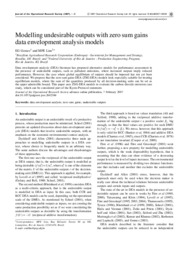Modelling undesirable outputs with zero sum gains data envelopment analysis models.
Modelling undesirable outputs with zero sum gains data envelopment analysis models.
Author(s): GOMES, E. G.
Summary: Data envelopment analysis (DEA) literature has proposed alternative models for performance assessment in the presence of undesirable outputs, such as pollutant emissions, where increased outputs imply reduced performance. However, the case where global equilibrium of outputs should be imposed has not yet been considered. We propose that the zero sum gains DEA (ZSG-DEA) models look especially suitable for treating equilibrium models, where the sum of the quantities produced by all decision-making units can be set as the upper admissible bound. This paper uses ZSG-DEA models to evaluate the carbon dioxide emission case study, which can be considered part of the Kyoto Protocol statement.
Publication year: 2008
Types of publication: Journal article
Observation
Some of Embrapa's publications are published as ePub files. To read them, use or download one of the following free software options to your computer or mobile device. Android: Google Play Books; IOS: iBooks; Windows and Linux: Calibre.
Access other publications
Access the Agricultural Research Database (BDPA) to consult Embrapa's full library collection and records.
Visit Embrapa Bookstore to purchase books and other publications sold by Embrapa.

